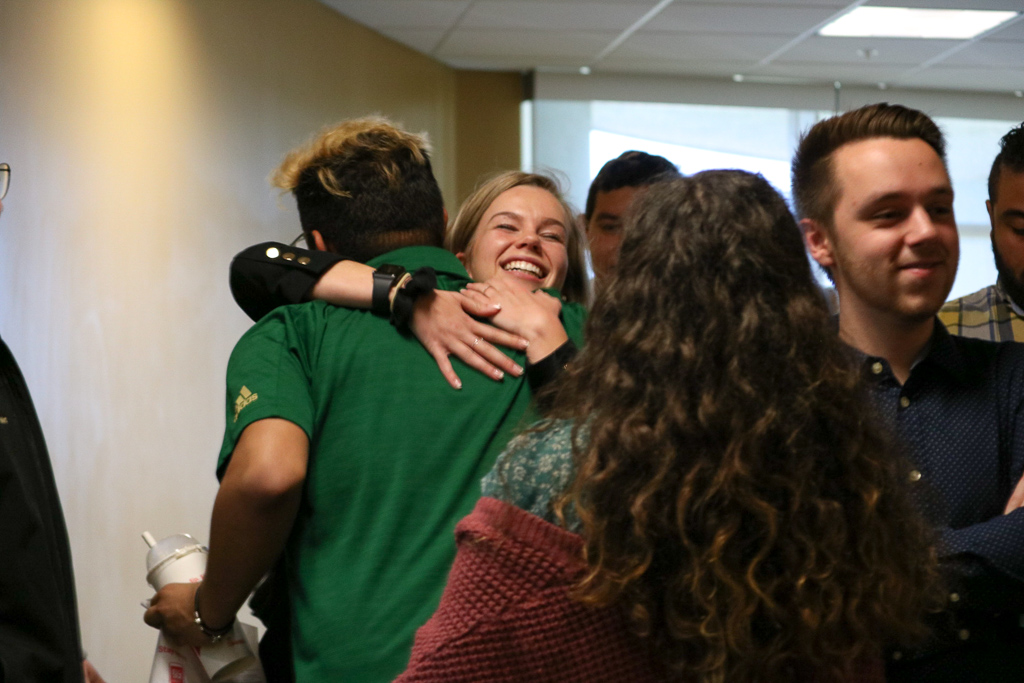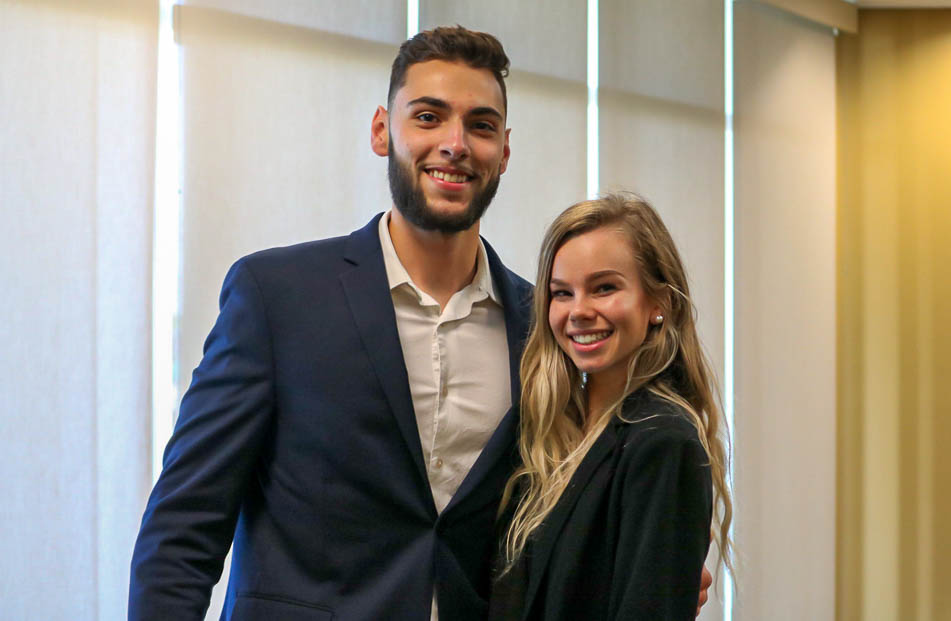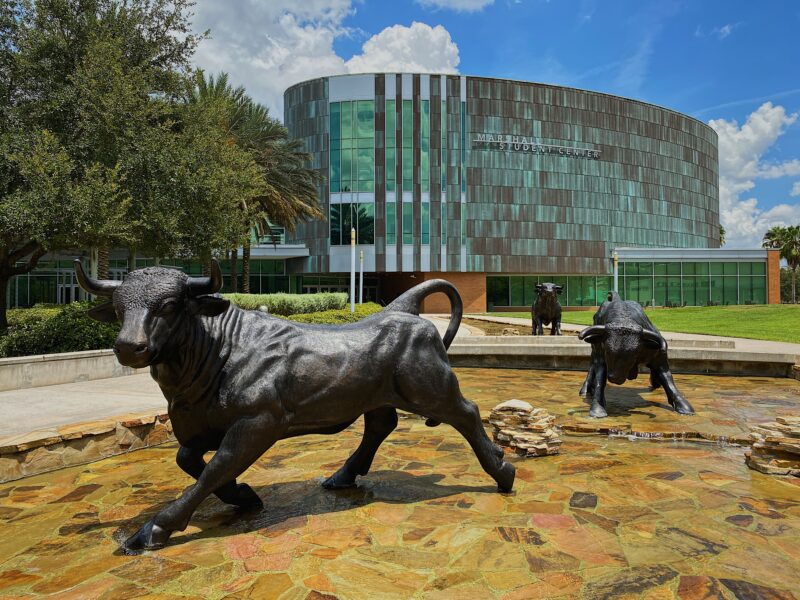Pictured above: Claire Mitchell (right) and Gustavo Spangher pose after being elected the first-ever SG president and vice president to lead over all three campuses. The announcement was made from the senate chambers on USF Tampa campus on March 6.
Story and photos by Carrie Pinkard
“Go for gold!” the crowd of about 50 University of South Florida students chanted over and over in the senate chambers on the USF Tampa campus.
It was a nod to the campaign slogan of Claire Mitchell and Gustavo Spangher, who were elected the first president and vice president of the soon-to-be consolidated USF Student Government on March 6.
The duo’s slogan stands for Green, Opportunity, Loyalty and Development. They now have the chance to implement that platform in Tampa, Sarasota and St. Petersburg.

Of more than 48,000 students across the USF system, 3,918 voted for SG president and vice president — roughly 8.6 percent.
Mitchell and Spangher earned a total of 1,815 votes, or 46 percent. Trevor Martindale and Darnell Henderson — the only non-Tampa presidential ticket — came in second with 1,141, or nearly 30 percent.
The other two tickets, Kuchari and Hyelampa Thala Kolo, and Peter Radulovic and Thomas Knudsen earned 635 and 327 votes, respectively.
Under consolidated SG statutes, a majority vote was not needed to elect the president and vice president. The winner was required to earn 10 percent more votes than the runner-up, according to Bob Herron, assistant director of St. Petersburg SG advising, training and operations.
Strong unity was shown on the St. Petersburg campus, as 80 percent of its voters chose Martindale and Henderson as their SG president and vice president.
This year, a total of 552 students voted for president on the St. Petersburg campus — a decrease from last year’s 574. However, with the lower enrollment numbers this year, the percentage of voters went up from about 12 percent to 15.
Martindale said running for SG president was an exhausting yet rewarding experience, but he is hopeful for the future of a consolidated USF.
“Darnell and I were hoping for a better outcome, but there is no denying that we put forth our best effort into this campaign,” Martindale said. “We wanted to set a precedent that St. Pete students could play a large role in the new consolidated SG.
“Unfortunately, we may have failed, but I hope future St. Pete students are not discouraged from being involved.”
Meanwhile, Andrea Campos and Isaiah Castle were elected governor and lieutenant governor of the St. Petersburg campus.
Campos and Castle received 359 votes, while their opponents, Jonathon Hatzistefanou and Veronica Jimenez, earned 178.
Campos said the first thing she wants to do is form an alliance with the Sarasota-Manatee campus.
“My first order of business will be meeting up with Sarasota-Manatee’s governor and talking with them about what it means to move forward as the first governors of our separate campuses of the system,” she said. “I really want it to be a good coalition of the smaller campuses, and I think it’s important for us to work together.”
The six St. Pete candidates who ran for the system-wide senate — Jonathon Hatzistefanou, Veronica Jimenez, Eran Fruehauf, Yelizza Mercedes, Michael Jordan and Emily Maronie — were all elected.
Fruehauf, the only candidate for campus council, was also elected. However, since he was also elected to the system-wide senate, it is not clear which position he will serve.
A total of nine system senators and nine campus council representatives will come from St. Petersburg, so a special election will be held in the summer to fill the remaining vacancies.
Also on the ballot was the Student Green Energy Fund referendum, which was renewed with 79 percent approval. The fund — which costs students $1 per credit hour — goes toward reducing greenhouse gas emissions, eliminating waste and improving conservation efforts.
USF Tampa will occupy 44 of the 60 seats on the system-wide SG senate. Despite Tampa’s majority under the consolidated SG structure, Campos said she wants to enter the new year from a place of collaboration.
“We can’t deny that they have a majority. They have a majority in the (system-wide) senate,” she said. “If we come together united with Sarasota-Manatee from the beginning, I think we can show the Tampa campus what we want and deserve as the branch campuses.”
It is unclear how much money Mitchell and Spangher will earn as the system-wide SG president and vice president. This year, the USF St. Petersburg SG president earns $10,968.75, and the vice president, $8,325.
On the Tampa campus, the student body president and vice president are each budgeted $16,789 this year, according to Gary Manka, Tampa’s director of SG advising, training and operations.
Mitchell is a second-year international studies and biomedical sciences double major from Melbourne, Florida. According to her LinkedIn profile, she also serves as the vice president of administration for the Beta Alpha chapter of Tri Delta at USF. Spangher is an accounting major from Brazil.
“I want students to know that we are from Tampa, but we’re here for all students,” Mitchell said.
“I am so passionate to let students know that. This consolidation process is going to be absolutely amazing for all of us — we’ll be able to combine our resources and combine the camaraderie that we have.”
Mitchell and Spangher said they don’t want the branch campuses to feel like they’re going to be left behind.
One of the first things they say they want to do is set up a system-wide task force where they can hear concerns from students across the campuses.
“Even though we ran on our initiatives and we believe in all of them, we want to listen to what students actually want to say,” Spangher said.
“We want to be able to hear voices from all campuses and from outside of SG as well. The governors would sit on that campus council, but we want outside voices as well so we can get that perspective,” Mitchell said.
The task force will consist of representatives from each campus and will meet weekly, according to the duo’s campaign website. Mitchell said in a Facebook comment on the USFSP’s Know It All’s Guide to Knowing It All that she plans to dedicate at least two days of travel to the branch campuses per week.
Aside from the task force, Mitchell is eager to set her eyes on improving mental health coverage at USF.
“One of the things I’m most excited about is definitely expanding all of the resources from the campuses,” Michell said. “I’m personally really excited for the expansion of the mental health services and just being sure all campuses have equal access and equal priority for that.”
Spangher said he’s passionate about expanding opportunities for international students and connecting those students from across the campuses.
“I was born in Brazil, and I have family from Venezuela, Argentina, Italy and Syria,” he said. I grew up in a very diverse environment, and I’m really passionate about diversity.”
Mitchell said she knows the task of uniting the three campuses will be a challenge, but she thinks it will ultimately be rewarding.
“I want students to approach this with an open mind and work with us through this process,” Michell said.
“It is so new, but it’s going to come with some amazing changes as we work to bring all students together.”
Savannah Carr contributed to this report.
.



